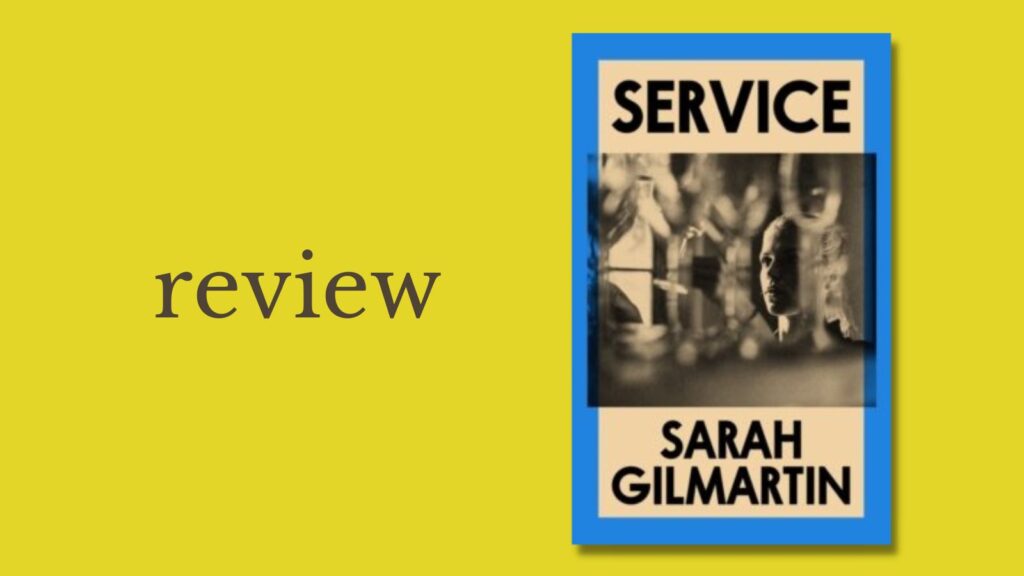
Service|Sarah Gilmartin|Pushkin Press|£16.99
Uncomfortable truths and complexity in Service, by Sarah Gilmartin
by Claire Hennessy
The summer before her final year of college, while the Celtic Tiger was still roaring, Hannah worked in a Dublin restaurant, a hip venue in “a large, Ivy-covered building two streets over from the Dáil” catering to “the type of men who liked a side order of banter with their steak and old world red”.
If she is honest with herself, years later, she knows that a good part of why she got the job was her attractiveness; it was the sort of place that only hired serving staff who were “easy on the eye”. It was the sort of place – hectic and frantic and intense – where so many small things happened that they often seemed “bearable, too diffuse to be a worry”.
We know where the plot is going from this first chapter of literary critic Sarah Gilmartin’s second novel, Service, not least because we are already told that there is an impending rape trial, one which Hannah does not want to be involved with. “I don’t want to be reduced to half an hour on a stand where all anyone remembers are the accusations of loose behaviour, drink and drugs,” she thinks (older now, and spot-on about the torment women are put through in such cases). And surely context matters: “How could you explain the restaurant to a jury? How could you explain it to yourself?”
Uncomfortable truths
As Hannah recalls that heady summer, that world of “talent and testosterone”, and her burgeoning friendship with the chef and “human exclamation mark”, Daniel Costello, the heightened world of both boomtime Dublin and a glamorous restaurant’s ‘backstage’ is evoked with pitch-perfect details: the mirrors and soft lighting, the walnut finish of the bar, the sometimes “obscene” tips. Food – often a source of tension in Gilmartin’s debut, Dinner Party – is described lovingly here, with Daniel eager to share his knowledge with his young, pretty protégée.
At the same time, in part because the present-day storyline focuses on Daniel and his wife Julie facing the impending trial, and in part because we know this story too well, alarm bells are blaring.
It is a testament to Gilmartin’s skill that Daniel avoids being a caricature and instead reminds us of that uncomfortable truth: the people who do terrible things are also human beings.
“I am not a monster,” Daniel tells us in his first chapter, although he is referring to losing his temper in the kitchen rather than the allegations of sexual assault. Like a pantomime audience, the reader of a certain age, disposition and online activity will be ready to shout “Oh yes you are!”
It is a testament to Gilmartin’s skill that Daniel avoids being a caricature and instead reminds us of that uncomfortable truth: the people who do terrible things are also human beings. We witness his genuine passion for cooking, his ambition and determination, his hurt and vulnerability at his elder son’s alienation.
But the dossier of evidence against him also accumulates; he gives himself away every so often in how he speaks about women, or the youth of today (“The generation don’t know they were born”). By the time he declares, “The thing you can’t say, without sounding like an arsehole . . .”, the reader’s verdict is already in.
Messy complexity
And yet there is enough here – enough nuance, enough humanity, enough messy complexity – to make it all worth reading, to keep us interested and invested throughout.
There are the stock answers that can be offered to the questions this novel poses, like when Hannah notes, “It is hard to say now, just as it was then, whether I encouraged him. I didn’t mean to.” The ‘correct’ answer is that she did not, that she was a young woman in a problematic, sexualised workplace, that she carries no blame for anything that might have happened to her.
And yet. And yet. There are many ways of knowing. We can know a thing and not quite believe it, for ourselves. We can know a thing and not admit it. We can be a victim and complicit, or a victim who does not behave in the ideal way, or a victim who lets down other victims.
Questions
The space that the novel as a form offers for this nuance and complexity is evident most particularly when the third narrator, Julie, speaks: often directly addressing her errant husband, and initially mostly concerned about the impact the media circus is having on family life.
Having tolerated “thousands of little dramas” from the restaurant over the years, Julie is tired, and caught in “the grey space of marriage”. There are things about her husband she loves, and others that have frustrated her; she is genuinely thrown by recent events. “How did I not know that my husband was involved with other women? And beneath this, the question that no one has asked me yet: How did I not know my husband was a predator?”
There are echoes here of the kinds of questions posed on the covers of female-centric psychological thrillers in which husbands are frequently up to no good; Jean Hanff Korelitz’s You Should Have Known particularly springs to mind for the thematic parallels as well as the elegant writing both books share.
Service also feels in conversation with works like Rebecca Makkai’s I Have Some Questions For You and Mary Gaitskill’s This Is Pleasure, which are attentive to changing social norms and the wider context of the specific incidents they explore.
If it is reductive to call this a “MeToo novel”, it would also be disingenuous not to. But it remains a novel rather than polemic or manifesto (although Julie does have a few heavy-handed lines towards the end), a fictional world we are immersed in right up until the end.












